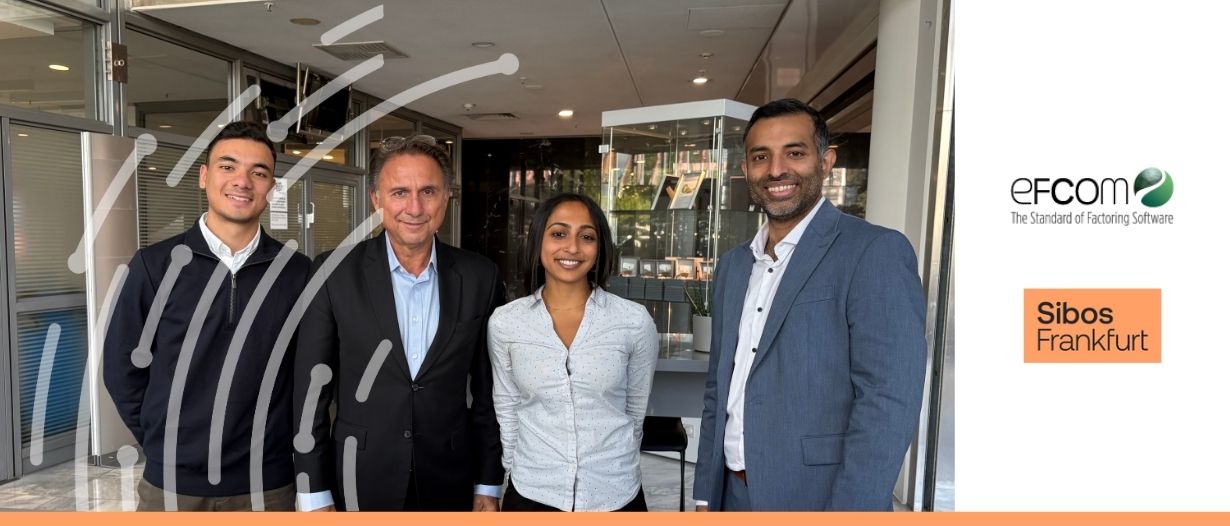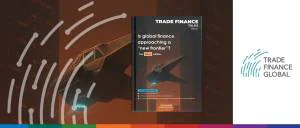- Factoring held global volumes nearing €3.8 trillion in 2023.
- The rise of Islamic finance, driven by its ethical principles and resilience post-2008, has led to increased interest in Islamic factoring.
- AI should augment human expertise, which remains essential for handling complex cases.
Factoring is seen as a somewhat niche corner of trade finance, but it underpins trillions in global commerce, with global volumes reaching nearly €3.8 trillion in 2023.
When a company sells goods or services, it may wait up to 30 to 90 days for its customer to pay their invoice. With factoring, businesses sell unpaid invoices to a third party (a factor), so they can get cash immediately. The third party pays most of the value upfront and when the customer finally pays the invoice, the factor sends the company the remainder, while taking a small fee for services.
Earlier this month, at the 2025 Sibos conference in Frankfurt, Germany, Trade Finance Global’s (TFG) Mahika Ravi Shankar spoke with Efcom’s Federico Avellán Borgmeyer, Chief Partner Officer, Vinai Biju, Data Scientist, and Abdelrahman El-Beltagi, Islamic Factoring Expert, at efcom.
Platforms like efcom provide the digital infrastructure for factoring companies. The conversation explored how efcom and factoring are evolving, with a focus on post-pandemic growth strategies, the expansion of Islamic factoring, and AI implementation.
Beyond the comfort zone: COVID-19 reset
For many, the isolatory period which the COVID-19 Pandemic forced on the world was unprecedented. It was difficult to picture interacting with other people outside of your household again, let alone to picture an interconnected global economy. But for efcom, the pandemic was a chance to reset; they conjured a strategy beyond familiar territory, turning their attention to emerging markets in the Middle East and North Africa, Southeast Asia, China, and Latin America.
Europe remains the most established factoring market in the world, with turnover exceeding €2 trillion in 2024, around two-thirds of global volumes. However, as Borgmeyer pointed out, if markets outside Europe develop to the same level, the growth potential will be immense.
Highlighting the significant growth the company has had since the pandemic, “If we were doing the same thing as before, we wouldn’t be nearly as far as we are today. COVID gave us the chance to reinvent ourselves and think globally,” he said.
One of the opportunities efcom identified during the pandemic was the rapid growth of Islamic finance. “We said, if we want to go into those markets, we need to speak their language,” Borgmeyer explained.
Islamic finance
Islamic finance refers to a way of managing money that adheres to the principles of Islam, operating under the belief that money itself does not have any value, and is merely a way to exchange goods and services. It doesn’t allow interest, uncertainty or speculation, and debt trading.
“After the 2008 financial crisis, the demand and the recognition of Islamic finance increased a lot,” said El-Beltagi. He explained that while many conventional banks collapsed under risky financial practices, Islamic banks – that largely prohibit such practices – proved far more resilient.
According to a 2013 whitepaper by the European Central Bank (ECB), the value of Islamic financial assets globally rose from $150 billion in the mid-1990s to $1.6 trillion by the end of 2012 — showing how rapidly the sector gained traction during the 2000s.
While the origin of the model is religion, “it’s a very stable and strong financial product. Some communities decide to do it because of that reason, not because they are Muslims,” he added, pointing to countries like the United Kingdom and Germany that have embraced Islamic financing.
However, there remains the matter of whether Islamic finance is perceived as a religious instrument or as a financial instrument based on religious principles.
“We are not calling the conventional factoring product ‘Christian,’ vis-à-vis Islamic,” Avellán Borgmeyer noted, pointing out that factoring predates both religions. Despite the label ‘Islamic,’ Islamic finance is a financial structure that adheres to certain religious rules.
To avoid hesitancy, in some markets, the model has been rebranded as “ethical finance,” with some non-Muslim countries adopting it under that label and framing it as a form of responsible, sustainable financing.
The Islamic Finance Council UK (UKIFC), for instance, has done extensive work in exploring the connection between Islamic finance and broader ethical finance, promoting greater coordination between the two and reflecting an effort to rebrand Islamic finance.
El-Beltagi emphasised that there were also particular challenges to developing a factoring model in Islamic finance. Factoring serves a diverse base (from retailers to manufacturers) and while conventional factoring is flexible, in Islamic finance every transaction has to adhere to particular rules – making it harder to design a one-size-fits-all structure.
Islamic factoring also has to work across a range of different Shariah-compliant contracts. “We wanted to gather all of that in one, not 100% of course, there is nothing perfect, but at least to cover the most,” said El-Beltagi, reflecting on efcom’s attempt to build a practical model.
There is also the issue of education. Many clients are unfamiliar with Islamic factoring or hesitant to be the first to adopt a new workflow. To tackle challenges like these, efcom has been investing heavily in another area: AI.
AI in factoring
“Talking about AI, we are talking about a competitive differentiation that we bring into the market,” said Biju. He explained that with AI, you can process massive volumes of invoices and generate risk scores for each client. This means providers can predict which customers are likely to delay payments, identify dilution, flag duplicate invoices, and detect potential fraud before it happens.
AI can also be extremely useful in client onboarding, with faster know your customer (KYC) checks, verification checks, and compliance checks.
Biju noted that one of the biggest hurdles in applying AI to factoring is data quality. “Garbage in, garbage out,” he explained – if the data is noisy or incomplete, the model’s predictions will be unreliable.
Compliance is another obstacle. In Europe, for example, strict General Data Protection Rules (GDPR) apply, but requirements differ across jurisdictions. Most AI models also operate as “black boxes” – not showing what is happening behind the scenes, making it difficult to explain to regulators how a risk score was generated.
Biju also stressed the importance of balancing AI with human expertise. While AI is effective for technical tasks like credit risk scoring or onboarding, when it comes to complex disputes, ones where “you may have to play around with emotions, complex negotiations, and customer relationships in place – then you need a human in the loop,” he said.
While Borgmeyer suggested factoring in the future could become fully automated, the danger of replacing entry-level work with AI lies in creating a vacuum when experienced veterans of factoring retire. If AI takes over repetitive junior tasks, the industry may struggle to train the next generation of factoring professionals. However, for Borgmeyer, innovation should always be embraced.
“Everything that can be done redundantly should be done by a machine, because innovation, as we have seen over the last 200 years, has only brought us more wealth and more well-being,” he said.
—
Looking ahead, the speakers agreed that AI and Islamic finance will reshape factoring. Biju highlighted how AI could slash workloads, while El-Beltagi noted that it can simplify Islamic factoring by easing documentation checks and help ensure compliance with Sharia boards, while decreasing human intervention.
By 2050, they predicted: factoring could reach 10% of global GDP, Islamic factoring will mature, and risk analysis will be at the click of a button.





























